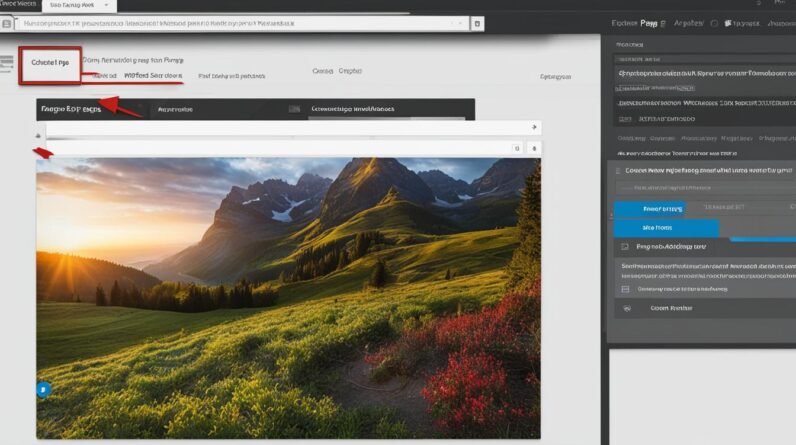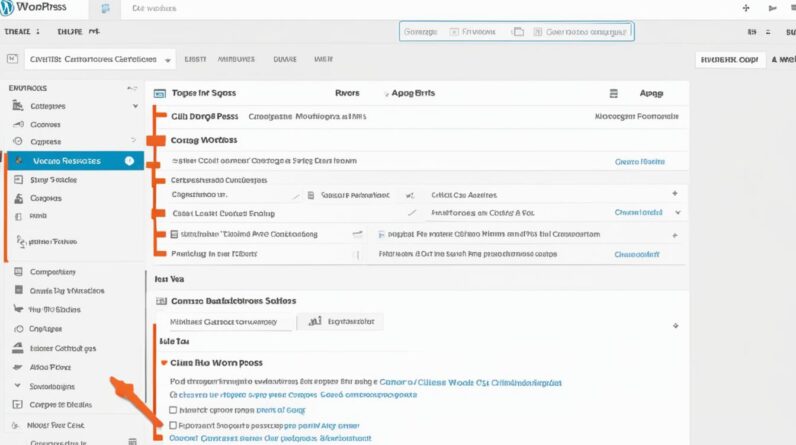Hello, fellow WordPress users! Are you looking to supercharge your website’s SEO performance? If so, you’ve come to the right place. In this guide, I will show you how to add keywords in WordPress without plugins, ensuring that your website is optimized for search engines.
How to Make Money with YouTube
Create an empire of automated video websites for multiple streams of income
We all know how important keywords are for SEO. They help search engines understand the content and relevance of your website, ultimately improving its visibility to potential visitors. While WordPress doesn’t natively support adding SEO keywords, fear not! With a few simple steps, you can manually add meta keywords without relying on plugins.
So, if you’re ready to take control of your website’s SEO and boost your search engine rankings, let’s dive into the world of WordPress keyword optimization without plugins!
Key Takeaways:
- Adding meta keywords in WordPress without plugins can improve your website’s SEO performance.
- Manually adding meta keywords allows for customization and control over keyword placement.
- Enabling custom fields and editing theme files are two methods to add keywords without plugins.
- On-page content and strategic keyword placement further enhance SEO optimization.
- Validating meta keywords ensures their correctness and effectiveness for improving search engine rankings.
Why Are Keywords Important for SEO?
Keywords are a fundamental aspect of search engine optimization (SEO) as they play a crucial role in helping search engines understand the content of your website. By strategically incorporating relevant keywords into your WordPress site, you can improve your SEO performance without relying on plugins.
Keywords serve as the bridge between users’ search queries and the content on your website. When you use the right keywords, search engines can determine the relevance of your website to specific search queries. This, in turn, can lead to improved visibility in search engine results pages and increased organic traffic.
Optimizing your website with keywords involves thorough research and analysis to identify the most relevant and high-performing keywords in your industry. By understanding your target audience and the terms they use when searching, you can tailor your content to match their intent and boost your search rankings.
The Benefits of Manual Keyword Addition in WordPress
Adding keywords manually in WordPress provides several advantages over relying on plugins:
- Enhanced Control: By manually adding keywords, you have full control over the selection and placement of relevant terms in your content.
- Flexibility and Customization: Unlike plugins that may have limitations, you can customize and optimize your keywords according to each specific page or post.
- Improved Performance: Manual keyword addition allows you to adapt your strategy over time as you analyze data and identify which keywords drive the most traffic and conversions.
By leveraging manual keyword addition techniques, you can take control of your WordPress SEO without plugins. This empowers you to optimize your website’s visibility, attract targeted organic traffic, and improve overall search engine rankings.
| Benefits of Manual Keyword Addition | Benefits of WordPress SEO Without Plugins |
|---|---|
| Enhanced control over keyword selection and placement | Flexibility and customization for each page or post |
| Opportunity to adapt and optimize keywords over time | Improved performance and increased organic traffic |
Adding Keywords in WordPress Using PHP Code
If you want to optimize keywords in WordPress manually, you can utilize PHP code to add them to your website. By doing so, you can conduct WordPress keyword research and implement keyword optimization techniques without relying on plugins.
Here’s how you can add keywords in WordPress using PHP code:
- Create a custom field for keywords in the post or page where you want to add them. This field will hold the keywords you want to optimize for.
- Open the
functions.phpfile of your WordPress theme. - Add the following PHP code snippet:
function add_meta_keywords() {
if (is_singular()) {
global $post;
$keywords = get_post_meta($post->ID, 'keywords', true);
if (!empty($keywords)) {
echo '<meta name="keywords" content="' . esc_attr($keywords) . '">';
}
}
}
add_action('wp_head', 'add_meta_keywords');
This code snippet checks if the current page is a singular page (post or page) and retrieves the keywords from the custom field named “keywords”. It then echoes the meta keywords tag with the retrieved keywords.
You can customize the field name and output to suit your needs. Ensure that you replace 'keywords' in the code with the actual name of your custom field.
By applying this technique, you can have better control over your keyword optimization efforts and tailor them to each post or page.
Advantages of Adding Keywords Using PHP Code
| Advantages | Explanation |
|---|---|
| Customization | You can customize keywords for each post or page based on their specific content and target audience. |
| Plugin-free | You don’t need to rely on additional plugins, reducing your website’s dependency on third-party tools. |
| Easier updates | Updating keywords is as simple as modifying the custom field’s value, making it more convenient than navigating through multiple plugin settings. |
| Control over output | With PHP code, you have direct control over how the keywords are inserted into the meta keyword tag, enabling you to adhere to best practices and optimization techniques. |
Implementing the above steps will enable you to manually optimize keywords in WordPress, giving you the flexibility to incorporate WordPress keyword research and implement keyword optimization techniques that best suit your website.
Enabling Custom Fields in WordPress
Before adding keywords using custom fields in WordPress, it is essential to enable this feature. Enabling custom fields allows you to manually insert meta keywords without the need for plugins. To enable custom fields:
- Go to the WordPress dashboard.
- Click on the “Panel” tab.
- Toggle the “Custom Fields” option to enable it.
Once you have enabled custom fields, a new section will appear below the text editor, where you can add custom fields specifically for meta keywords. Enabling this feature gives you more control over the SEO optimization of your WordPress site.
By using custom fields, you can tailor meta keywords to each post or page, helping search engines understand the content and improving your website’s visibility.
Creating a Custom Field for Meta Keywords
Now that custom fields are enabled, we can proceed to create a custom field specifically for meta keywords. This will allow us to add relevant keywords to our WordPress site without the need for plugins.
To create the custom field, follow these steps:
- Go to the post or page where you want to add the meta keywords.
- Scroll down below the text editor, and you’ll find the “Custom Fields” section.
- In the “Name” field, enter a descriptive name for your custom field, such as “keywords”.
- In the “Value” field, add the desired keywords separated by commas.
- Click the “Add Custom Field” button to save the custom field.
By creating a custom field for meta keywords, you have complete control over the keywords you want to include for each post or page on your WordPress site. This allows you to tailor the meta keywords to match the content and optimize them for search engine visibility.
Note: Make sure to choose keywords that are relevant to your content and target audience. Keyword research can help you identify the most effective keywords for optimization.
Updating the Post and Verifying Meta Keywords
Once you have added the custom field for meta keywords, it is important to update the post to ensure that the changes take effect. To do this, simply navigate to the post editor in WordPress and make any necessary updates or modifications to the content. Once you have completed the updates, remember to save or publish the post to apply the changes.
After updating the post, it is crucial to verify the presence and correctness of the meta keywords. This can be done by viewing the source code of the post, which contains the HTML markup. Here’s how you can do it:
- Press Ctrl+U to display the page source code
- Alternatively, right-click on the page and select “View Page Source”
By inspecting the source code, you will be able to locate the meta keywords tag and check if the keywords you added are correctly implemented. Ensure that the custom field value you entered is reflected in the meta keywords section.
If you are unfamiliar with HTML or find it challenging to navigate the source code, there are online tools available that can help you analyze and validate the meta keywords. However, it is always recommended to have a basic understanding of HTML to independently verify the correctness of the meta keywords.
Example:
| Step | Instructions |
|---|---|
| Step 1 | Open the post editor in WordPress |
| Step 2 | Make any necessary updates or modifications to the content |
| Step 3 | Save or publish the post to apply the changes |
| Step 4 | Press Ctrl+U to display the page source code |
| Step 5 | Locate the meta keywords tag in the source code |
| Step 6 | Verify the presence and correctness of the meta keywords |
By following these steps, you can ensure that your meta keywords are updated and correctly implemented, helping improve the SEO performance of your WordPress site.
Understanding the Significance of Meta Keywords for SEO
Although the importance of meta keywords in SEO has diminished over time, they still have some impact. Search engines analyze meta keywords to determine the relevance of a website to search queries.
Meta keywords can help search engines understand the intent behind a visitor’s search query and establish semantic associations between the content and specific keywords.
However, it’s important to note that meta keywords should not be solely relied upon for improving search engine rankings. While they can provide some additional context, search engines now primarily focus on other factors such as quality content, user experience, and backlinks.
In today’s SEO landscape, the relevance and quality of your content, as well as other off-page factors, play a larger role in determining search rankings. It’s essential to focus on creating high-quality, informative content that meets the needs of your target audience.
That being said, meta keywords can still be considered as a part of your overall SEO strategy. Including them in your website’s meta tags may provide additional signals to search engines, helping them understand the topics and themes of your content.
Remember, SEO is a holistic approach where multiple elements work together to improve your search rankings. While meta keywords have diminished in importance, they can still contribute to your overall SEO efforts when used strategically and in conjunction with other best practices.
By focusing on creating valuable content, optimizing on-page elements, building high-quality backlinks, and providing a great user experience, you can improve your website’s visibility and organic search traffic.
Editing Theme Files to Add Meta Keywords
Another effective method of adding meta keywords in WordPress is by manually editing the theme files. By locating the <head> section in the header.php file of your theme and adding the meta keywords tag with the desired keywords, you can insert meta keywords without relying on plugins. However, it is important to exercise caution and have some knowledge of HTML to prevent any issues that may arise and potentially break the theme.
If you’re unsure about making changes to the theme files, it’s recommended to first create a backup and consult with a developer or professional who can guide you through the process.
Here’s an example of how you can add meta keywords to your theme files:
<head>
<meta name="keywords" content="keyword1, keyword2, keyword3">
</head>
Replace keyword1, keyword2, keyword3 with your desired keywords, separated by commas. Make sure to save the changes and check the website to ensure that the meta keywords are being displayed correctly in the source code.

Adding meta keywords through theme file editing provides you with more control over keyword optimization in WordPress. Remember to choose relevant and specific keywords that accurately reflect the content of your website.
On-Page Content and Keyword Placement
In addition to meta keywords, on-page content plays a critical role in optimizing your WordPress site for search engines. By strategically placing relevant keywords throughout your content, such as blogs, landing pages, and product descriptions, you can further enhance your on-page SEO optimization and attract more organic traffic.
Importance of Keyword Placement
The placement of keywords within your on-page content is crucial for search engines to understand the topics discussed on your website. By incorporating keywords naturally and strategically into headings, subheadings, body paragraphs, and image alt tags, you provide search engines with clear signals about the relevance and subject matter of your content.
Optimizing On-Page Content for Keywords
To optimize your on-page content for keywords, consider the following tips:
- Perform thorough keyword research to identify the most relevant and valuable keywords for your target audience.
- Place primary keywords in prominent positions, such as the beginning of headings and within the first paragraph.
- Avoid keyword stuffing and ensure that the placement of keywords feels natural and organic within the context of your content.
- Utilize variations of your primary keywords and long-tail keywords to diversify your content and capture a wider range of search queries.
- Include keywords in image alt tags and captions to optimize your visuals for search engine crawlers.
- Create informative and engaging content that aligns with search intent and provides value to your audience.
To illustrate the importance of keyword placement, here is an example of how keyword optimization can impact search engine rankings:
| Keyword | Search Engine Ranking |
|---|---|
| Best WordPress plugins | #2 |
| Top WordPress plugins | #5 |
| Popular WordPress plugins | #10 |
By strategically placing the keywords “best WordPress plugins,” “top WordPress plugins,” and “popular WordPress plugins” within the on-page content, the website was able to achieve higher search engine rankings, resulting in increased visibility and organic traffic.
Optimizing your on-page content for keywords is an essential aspect of SEO. By following best practices and providing valuable, keyword-rich content, you can improve your website’s visibility, attract more organic traffic, and ultimately drive success for your WordPress site.
Validating Meta Keywords
Validating your meta keywords is an essential step in ensuring their correct implementation. To check the presence and correctness of your meta keywords, you can inspect the HTML code of your website. By using online tools specifically designed for validating meta keywords, you can gain valuable insights for improvement. Here are some tools that can assist you in this process:
1. W3C Markup Validation Service
The W3C Markup Validation Service is a reliable tool for validating HTML code, including your meta keywords. By entering the URL of your website, the tool will analyze the HTML code and highlight any errors or issues related to your meta keywords. It provides detailed feedback to help you make the necessary adjustments for optimal keyword implementation.
2. SEO Site Checkup
SEO Site Checkup is a comprehensive SEO analysis tool that can also help you validate your meta keywords. It offers a range of features to evaluate different aspects of your website’s SEO performance, including the presence and correctness of meta keywords. The tool provides recommendations and suggestions for improving your meta keyword implementation to enhance SEO effectiveness.
3. SEMrush
SEMrush is a popular SEO toolkit that offers various tools and features for optimizing your website. It includes a comprehensive site audit feature that can check the presence and correctness of your meta keywords. By generating detailed reports, SEMrush helps you identify any issues with your meta keyword implementation and provides actionable recommendations for improvement.
4. Google Search Console
Google Search Console is a powerful tool provided by Google that allows you to monitor and optimize your website’s presence in search results. Within the Search Console interface, you can access the “Enhancements” section, which includes a report on your website’s structured data, including meta keywords. This report highlights any errors or warnings related to your meta keyword implementation, providing valuable insights to enhance your SEO efforts.
By utilizing these tools, you can ensure that your meta keywords are correctly implemented and optimized for better search engine rankings. Regularly validating your meta keywords is an essential part of maintaining SEO effectiveness and improving your website’s visibility in search results.
Conclusion
In conclusion, optimizing keywords in WordPress without plugins is an effective way to improve your website’s SEO performance. By manually editing theme files and strategically placing keywords in on-page content, you can optimize your WordPress site and increase its visibility in search engine rankings.
When adding keywords, it is important to choose relevant and specific terms that accurately represent the content of your website. Performing competitor analysis can provide insights into popular keywords used by competitors, allowing you to identify potential opportunities for optimization.
Additionally, validating your meta keywords is crucial to ensure they are implemented correctly. Use tools such as the W3C Markup Validation Service, SEO Site Checkup, SEMrush, and Google Search Console to check the presence and correctness of your meta keywords.
By following these WordPress SEO best practices and considering the significance of meta keywords, you can optimize your WordPress site for search engines and attract more organic traffic. Remember, optimizing keywords in WordPress is a continuous process, and regularly updating and refining your keyword strategy will help improve your website’s performance in the long run.
FAQ
How do I add keywords in WordPress without plugins?
To add keywords in WordPress without plugins, you can manually edit the theme files or use PHP code to insert meta keywords. This gives you more control over the output and allows for customization of keywords for each post or page.
Why are keywords important for SEO in WordPress?
Keywords play a crucial role in SEO as they help search engines understand the content of your website. By strategically placing keywords in your WordPress site, you can improve your SEO performance without relying on plugins.
How can I add keywords in WordPress using PHP code?
You can add keywords in WordPress using PHP code by inserting the code in the functions.php file. This code will retrieve the keywords from custom fields and insert them into the meta keyword tag, giving you more control over the output.
How do I enable custom fields in WordPress for meta keywords?
To enable custom fields in WordPress for meta keywords, toggle the “Custom Fields” option under the “Panel” tab in the WordPress dashboard preferences. This will allow you to add custom fields specifically for meta keywords.
How do I create a custom field for meta keywords in WordPress?
After enabling custom fields, you can create a custom field for meta keywords by entering a name for the custom field, such as “keywords”, and adding the desired keywords separated by commas in the value field.
How do I update a post and verify the presence of meta keywords in WordPress?
After adding the custom field for meta keywords, you need to update the post for the changes to take effect. Once updated, you can verify the presence and correctness of the meta keywords by viewing the source code of the post and checking the meta keywords tag.
What is the significance of meta keywords for SEO in WordPress?
Although the importance of meta keywords in SEO has diminished over time, they still have some impact. Search engines analyze meta keywords to determine the relevance of a website to search queries and establish semantic associations between the content and specific keywords.
How can I edit theme files to add meta keywords in WordPress?
You can manually edit the theme files by locating the
section in the header.php file of your theme and adding the meta keywords tag with the desired keywords. However, this method requires some knowledge of HTML and should be done cautiously to avoid breaking the theme.
How can I optimize on-page content and keyword placement in WordPress?
In addition to meta keywords, on-page content is crucial for keyword optimization. By strategically placing keywords in your content, such as blogs, landing pages, and product pages, you can further enhance the SEO performance of your WordPress site and attract more organic traffic.
How can I validate my meta keywords in WordPress?
To validate your meta keywords in WordPress, you can inspect the HTML code of your website using tools like W3C Markup Validation Service, SEO Site Checkup, SEMrush, or Google Search Console. These tools can help ensure the presence and correctness of your meta keywords and provide insights for improvement.
What are some concluding thoughts on keyword optimization in WordPress?
Adding keywords in WordPress without plugins is possible by manually editing theme files and optimizing on-page content. By following the steps outlined in this guide and considering the significance of meta keywords, you can optimize your WordPress site for SEO without relying on plugins. Remember to choose relevant and specific keywords, perform competitor analysis, and validate your meta keywords to ensure their effectiveness in improving search engine rankings.






